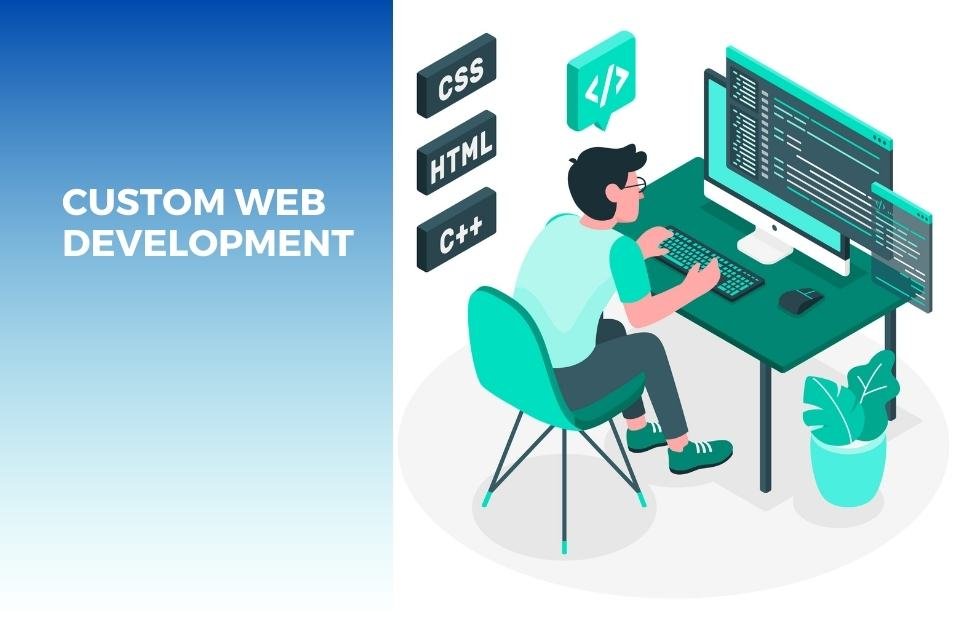In today’s competitive digital landscape, businesses require unique and innovative web solutions to stand out effectively and engage their target audience. Custom web development services play a critical role in creating tailored solutions that cater to the specific needs of organizations.
These services enable companies to harness the power of cutting-edge technology, drive customer engagement, and stay ahead of the competition. This paper aims to provide an in-depth overview of custom web development services, compare them with template-based solutions, and outline the various offerings and industry applications.
Custom Web Development vs. Template-Based Solutions
When it comes to website development, businesses can choose between custom web development and template-based solutions. Understanding the key differences and weighing the pros and cons can help organizations make informed decisions.
Custom Web Development: Custom web development involves creating a website from scratch tailored to the specific requirements and goals of the business. It offers a high degree of flexibility, customization, and scalability.
Pros:
- Unique design and user experience
- Tailored functionality and features
- Better performance and optimization
- Scalability and adaptability to future needs
Cons:
- Higher upfront costs
- Longer development time
Template-based Solutions
Template-based solutions utilize pre-designed templates, with businesses customizing the content and limited design elements to create their websites.
Pros:
- Lower upfront costs
- Faster development time
- Suitable for small businesses with limited requirements
Cons:
- Limited design and customization options
- Potential performance and scalability issues
- Lack of unique identity
Organizations must consider budget, timeline, scalability, and unique requirements when deciding between custom web development and template-based solutions.
Services Offered by Custom Web Development Companies
Custom web development companies offer a wide array of services to cater to the diverse needs of businesses. Some of the key offerings include:
- Custom website design and development: Design and build bespoke websites tailored to the organization’s goals, branding, and user experience requirements.
- Content management system (CMS) development: Develop custom CMS solutions or tailor existing platforms (e.g., WordPress, Drupal) to manage website content efficiently and securely.
- Web application development: Create custom web applications that streamline business processes, enhance customer engagement, and support organizational growth.
- E-commerce platform development: Design custom e-commerce platforms that provide an intuitive shopping experience, support various payment gateways, and integrate with inventory management systems.
- API development and integration: Develop custom APIs and integrate them with third-party services to expand website functionality, improve data exchange, and enhance the user experience.
- Responsive and mobile-first development: design and build websites that adapt to various screen sizes and devices, ensuring an optimal user experience across desktops, tablets, and smartphones.
- Website maintenance and support services: Provide ongoing support, maintenance, and updates to keep websites running smoothly, securely, and up-to-date with the latest technologies and trends.
By leveraging custom web development services, businesses can create tailored, high-performance solutions that align with their unique needs, drive customer engagement, and support long-term growth.
Technologies and Tools for Custom Web Development
Successful custom web development projects require the right combination of technologies, tools, and libraries. Here’s a look at some popular choices:
Front-end technologies and libraries:
HTML, CSS, and JavaScript: the foundational building blocks for web development
React, Angular, and Vue.js are popular front-end libraries and frameworks that enable faster and more efficient development.
Back-end technologies and frameworks:
Node.js,.NET, Java, Python, Ruby, and PHP: are widely used programming languages for server-side development.
Express, Django, Ruby on Rails, Laravel, and Spring Boot: are robust back-end frameworks that facilitate rapid application development.
Databases and data storage solutions:
SQL databases: MySQL, PostgreSQL, and SQL Server are popular relational database management systems.
NoSQL databases: MongoDB, Cassandra, and Couchbase offer flexible, scalable, high-performance data storage options.
Content management systems (CMS):
WordPress, Drupal, Joomla, and Craft CMS empower non-technical users to manage website content effectively.
Development tools and environments:
Visual Studio Code, Sublime Text, and JetBrains IDEs: These integrated development environments (IDEs) and text editors streamline the development process.
Industry Applications and Case Studies
Custom web development services have made a significant impact across various industries. The following are some special applications:
- Finance and banking: Custom web development enables the creation of secure, user-friendly online banking platforms and financial management applications.
- Healthcare and life sciences: tailored web applications streamline patient care management, electronic health records, and telemedicine services.
- Manufacturing and logistics: Custom solutions can optimize supply chain management, inventory tracking, and resource planning.
- E-commerce and retail: Bespoke e-commerce platforms provide a unique and intuitive shopping experience, driving customer engagement and conversions.
- Media and entertainment: Web applications have revolutionized content distribution and streaming services, catering to diverse user preferences.
- Education and e-learning: Custom learning management systems and online course platforms expand access to quality education and promote collaboration.
- Non-profit and social services: Tailored web solutions help non-profit organizations manage fundraising, donor relations, and program delivery.
- Government and public services: Custom web applications enhance public communication, service delivery, and citizen data management.
Key Factors for Successful Custom Web Development Projects
For custom web development projects to succeed, organizations should consider the following:
- Clearly define project goals and requirements: Establish a clear vision and objectives to guide development.
- Choose the right web development company or team: Select a skilled, experienced development team that aligns with your organization’s needs and values.
- Effective communication and collaboration: Ensure open stakeholder communication, fostering a collaborative development environment.
- Adherence to best practices and industry standards: Follow web development best practices, such as responsive design, accessibility, and security.
- Regular testing, iteration, and feedback: test and refine the website or application throughout the development process, incorporating stakeholder feedback.
- Post-launch maintenance and support: Maintain ongoing support and updates to ensure the website stays secure, up-to-date, and optimized.
Challenges and Future Trends in Custom Web Development
Custom web development faces several challenges and evolving trends, such as:
- Balancing customization and maintainability: Striking the right balance between highly customized solutions and maintainable code is crucial.
- Ensuring compatibility with emerging technologies: Web developers must stay updated on new technologies and trends to maintain compatibility and future-proof their solutions.
- Web performance optimization: Delivering a fast, responsive user experience requires developers to optimize website performance continually.
- Security and data protection considerations: Custom web development projects must prioritize security and data protection to comply with regulations and protect user information.
- Integration with third-party services and APIs: Developers must navigate the complexities of integrating custom web applications with various third-party services and APIs.
- As custom web development continues to evolve, businesses must adapt to the changing landscape, ensuring they remain competitive and deliver exceptional user experiences. By understanding the technologies, tools, and industry applications, organizations can leverage custom web development services to create tailored solutions that drive success in the digital age.
Conclusion
To succeed in today’s competitive digital environment, businesses require bespoke web development services that allow them to create and launch websites and apps that are both distinctive to their operations and highly user-friendly. Organizations must take into account a variety of factors before starting a bespoke web development project, as we have seen throughout this extensive guide.
Enterprise Web Development: Strategies, Technologies, and Practices

